Oct 11, 2021
by Ed Spratt
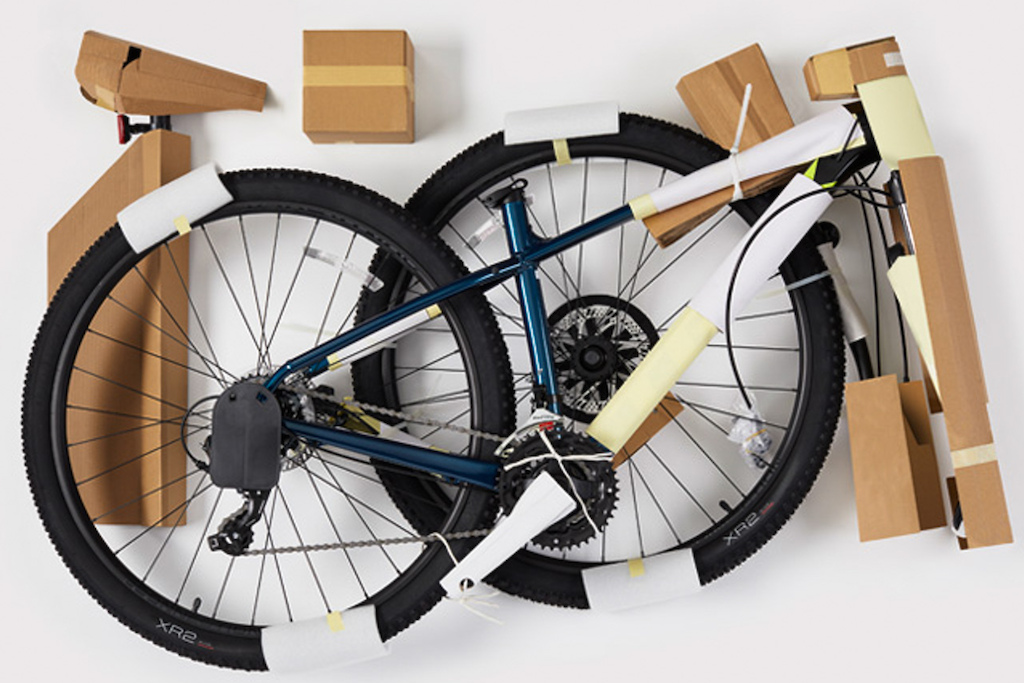
Trek has become one of the first major bike brands to release an in-depth study into its environmental impact and ways it can improve sustainability in the future.
The Sustainability Report covers everything from the carbon emissions created by different models in its ranges, to recycled plastic usage, and different shipping options. We have taken a look through Trek's report to find some of the more interesting takeaways.
1. Carbon frames produce three times carbon emissions than alloy
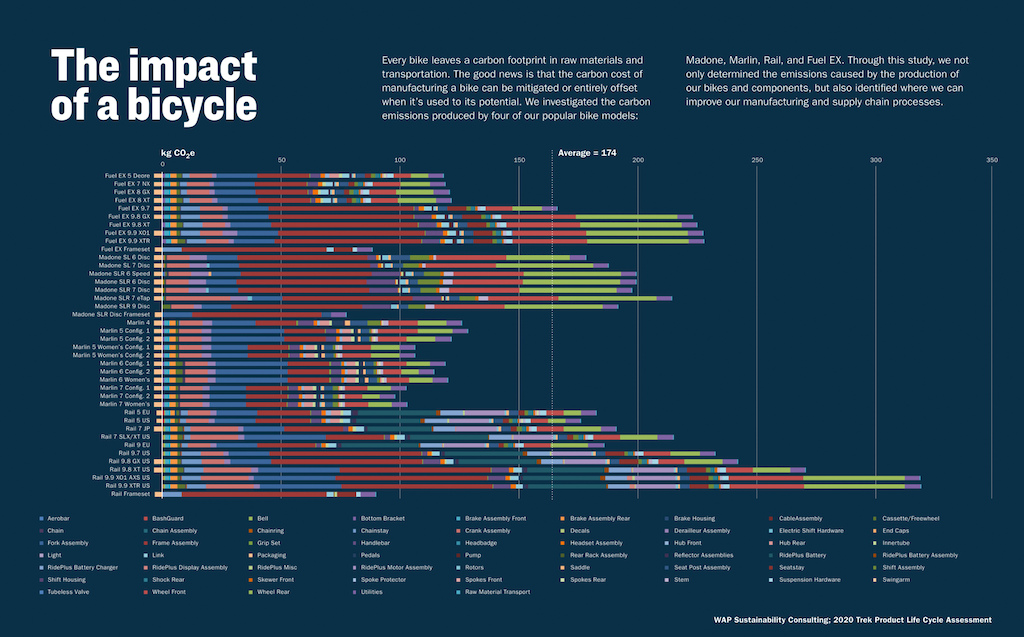
The most interesting part of Trek's new report is a study completed on the carbon emissions created by the raw materials, manufacturing and transporting its bikes. Trek decided to investigate the carbon emissions for four of its most popular models (Madone, Marlin, Rail and Fuel EX), then broke each down by the different spec options. The biggest takeaway from this study is the significant impact carbon fibre can have on emissions, with carbon frames appearing to produce around three times higher emissions than their aluminium counterparts*.
To take the Fuel EX range as an example, the highest level alloy framed bike appears to produce ≈120 kg C02e on Trek's chart, way below the average in this test of 174 kg C02e. However, the base-level carbon Ful EX creates just above the average emissions level at ≈175 kg C02e. At the very top of the Fuel EX range, on a bike that contains a lot of carbon components alongside a carbon frame, the emissions rise even further to an estimated ≈225 kg C02e for the 9.9 X01 and XTR models. Incredibly, just the Fuel EX carbon frameset sits at around ≈80 kg C02e, meaning a carbon frame alone is not far off the emissions of a complete alloy Fuel EX 8 (≈120kg).
Of course, emissions aren't everything when it comes to the environmental impact of a bike and, as RC covered back in 2018, there is a lot more nuance to the debate of which material is more environmentally friendly. However, the new data from Trek does paint a picture that in terms of emissions, an alloy bike could be the better choice for the environment.
The numbers in the report appear to cover the raw materials, transportation and manufacturing emissions needed to create a bike, but the study doesn't include potential costs to recycle or dispose of the frames and components after use. In the report, Trek does recognise that depending on the use of the bike the carbon emissions cost can be mitigated or entirely offset and through its carbon emissions testing Trek has now found ways to potentially improve its manufacturing and supply chain processes.
*We reached the three times emissions figure by measuring the pixels on the chart supplied by Trek in the report. We found that the Fuel alloy frame is 74 pixels with 211 pixels for the carbon version. A very similar result can be found for the Rail eMTB with 61 pixels for the alloy frame and 221 for the carbon offering. We don't have the exact figures from Trek, which would provide more accurate results, but it is still interesting to see a ballpark figure of around a three times emissions increase for carbon frames.
2. eMTBs Come with a Big Emissions Impact
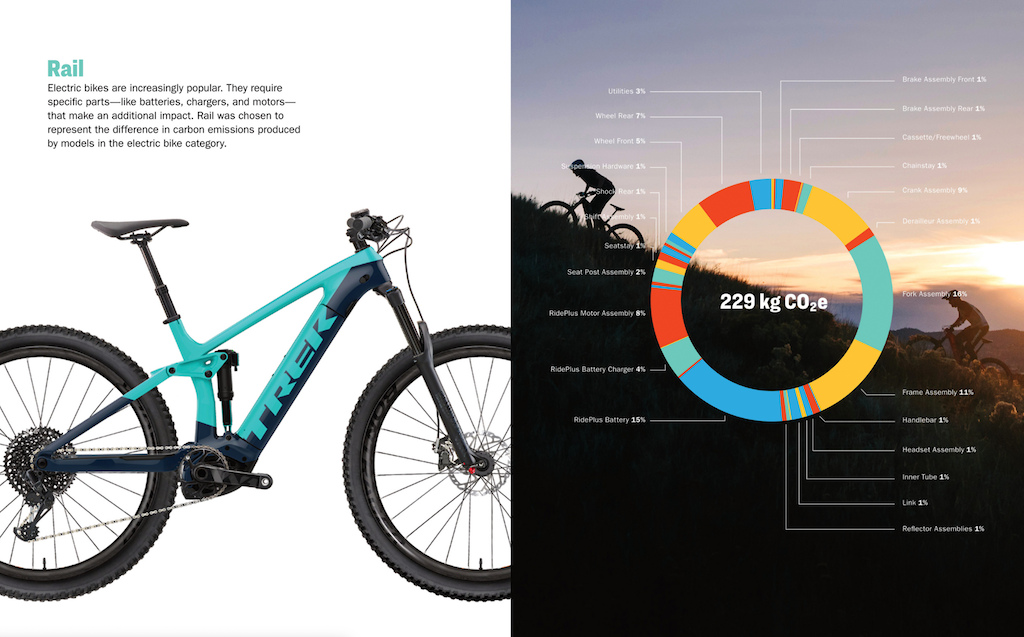
In news that will come as a surprise to no one, choosing an eMTB has a sizeable increase in the emissions of a bike.
Trek's Rail model was included in the study and the average emissions for this bike sit at 229 kg C02e. Once again, the frame material can play a big part in this total as the lower end alloy Rail 5 falls around the average of 174 for its emission but flying past this point is the top of the range Rail 9.9, which is the biggest carbon emitter from the dataset with a total of well over 300 kg C02e.
In the breakdown of parts, forks are the largest contributor at 16%, with batteries totaling 15% of the emissions and the frame assembly responsible for 11% of the Rail's carbon emissions.
3. A Full-Suspension Frame Doesn't Necessarily Mean More Emissions
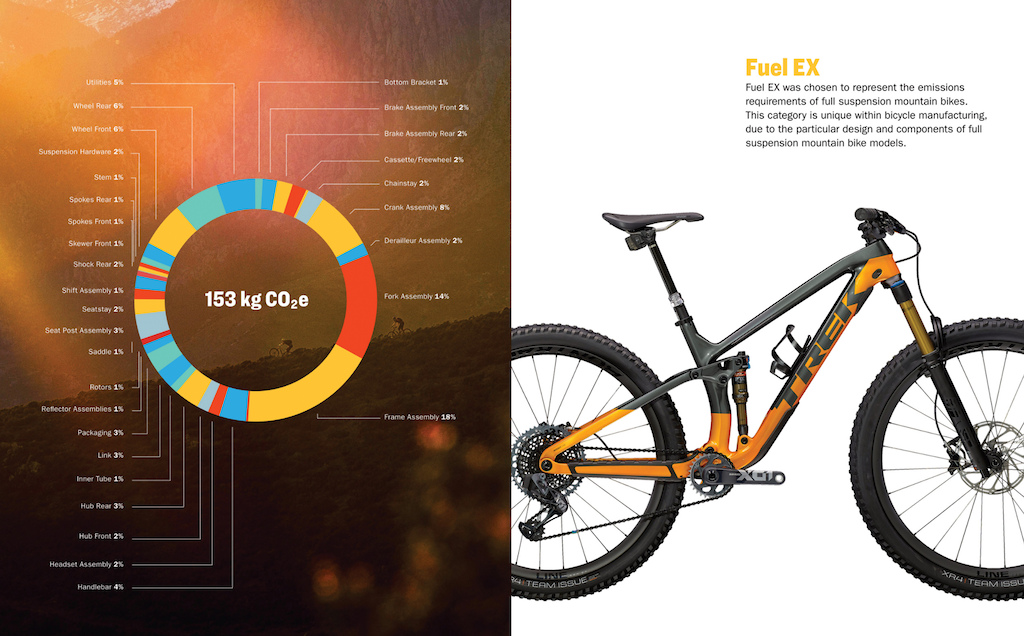
While suspension can add a significant cost to a bike, with an almost $2000 gap between the lower end Marlin and Fuel EX bikes tested in this study, there does not seem to be that much emissions difference in adding suspension to a bike.
Trek's entry-level hardtail the Marlin was found to have average carbon emissions of 116 kg C02e, with the largest source being the frame assembly at 17%, whereas the Fuel EX has average carbon emissions of 153 kg C02e across the different models. Similar to the Marlin, the largest source is the frame assembly at 18%.
While this figure suggests an additional environmental cost of a full-suspension frame, the increase in the average figure mostly comes from the split between carbon and alloy frames. Looking at the emissions chart featured above, you can see that the alloy Fuel EX models do sit at or below some of the emissions levels of the alloy Marlin hardtails. It's worth saying that the comparison between these bikes is not a like for like in spec, but it's interesting to see a well-specced alloy full suspension bike can have the same carbon emissions as an entry-level hardtail.
4. Air Freight has 84 times the carbon footprint of Ocean Freight
No matter what the frame material or design of your bike, there's one factor that blows it all out of the water - shipping. Transporting bikes around the world is the largest contributor to Trek's global emissions but the brand does have plans to reduce its footprint in this area.
There are two main ways to ship bikes, air freight and ocean freight, and in this contest, there's a clear environmental winner as ocean freight produces 84 times fewer emissions than air freight. In the report, Trek does note that while ocean freight is more efficient, cheaper and environmentally friendly it is far slower than using air to get products around the globe. To combat the massive negative effect of sending things by air, Trek has stated it wants to reduce air freight by 75% of pre-2020 levels by 2024. To achieve this lofty goal it has come up with the idea of reducing the number of trips needed by predicting which products will be in highest demand throughout the year.
Part of Trek's plan to reduce emissions from transportation also includes furthering its idea of consolidated shipping. Trek's sole distributor in Europe, located in the Netherlands, has put in place a weekly shipping window for retailers to combine multiple orders into a single shipment to reduce the impact of transporting the products. The new plan also means holding warranty, individual orders and inventory orders throughout the week to ship on one designated day in batch shipments.
5. 433,600 lbs of plastic packaging removed since 2020
Although we have already covered Trek's massive efforts to reduce its plastic packaging, the new report does reveal some interesting stats in the breakdown of the 433,600 lbs of plastic already removed. The number that stood out to us most was that Trek has removed 95% of landfill waste in the packaging of the Rail eMTB.
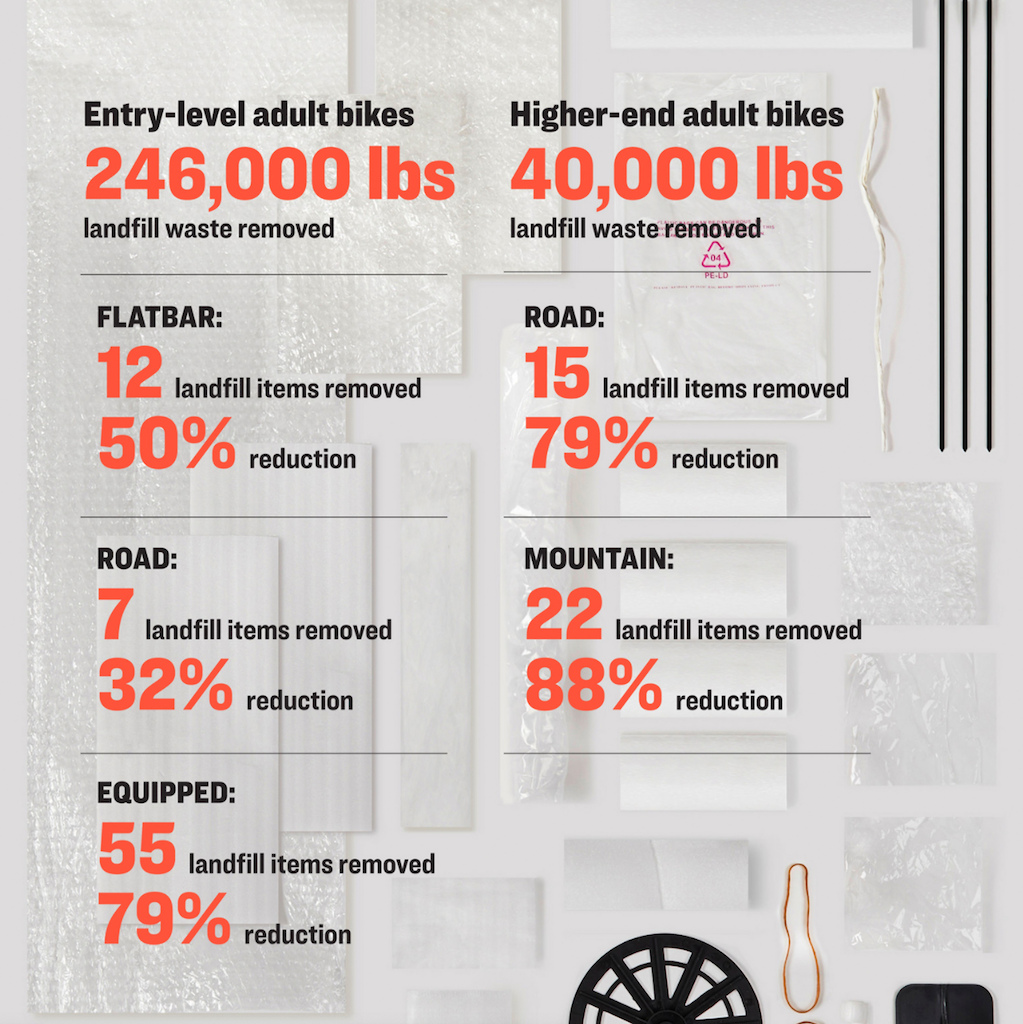
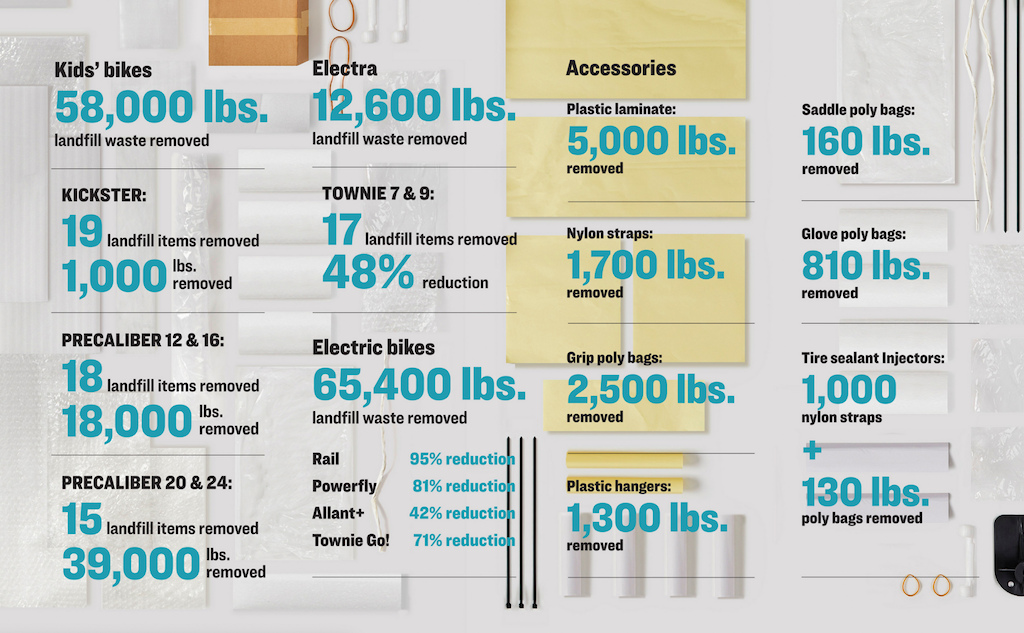
6. Trek is the only major bike manufacturer to release a sustainability report
While we have covered plenty of schemes and pledges in the past Trek's sustainability report is the first of its kind from one of the major bike manufactures. Alongside the report's coverage of each bike's carbon emissions and the impact of its business Trek also covered environmental goals for the future. The 10 areas Trek is focusing on improving are:
- Reducing the use of air freight
- Consolidate shipments to retailers
- Increase reliance on renewable energy
- Reduce corporate travel
- Increase reliance on alternative materials
- Create zero-landfill manufacturing facilities
- Establish and protect new trails
- Remove plastic waste from packaging
- Increase access to bike share
- Shift cycling mode share
Yes, it's going to be easy to pick apart individual practices and stats in this report, but you have to commend Trek for being so open and forthcoming with the data and being one of the brands at the forefront of cleaning up the bike industry. We commend Trek on its pledges and hope that it inspires other brands to follow its lead.
No comments:
Post a Comment